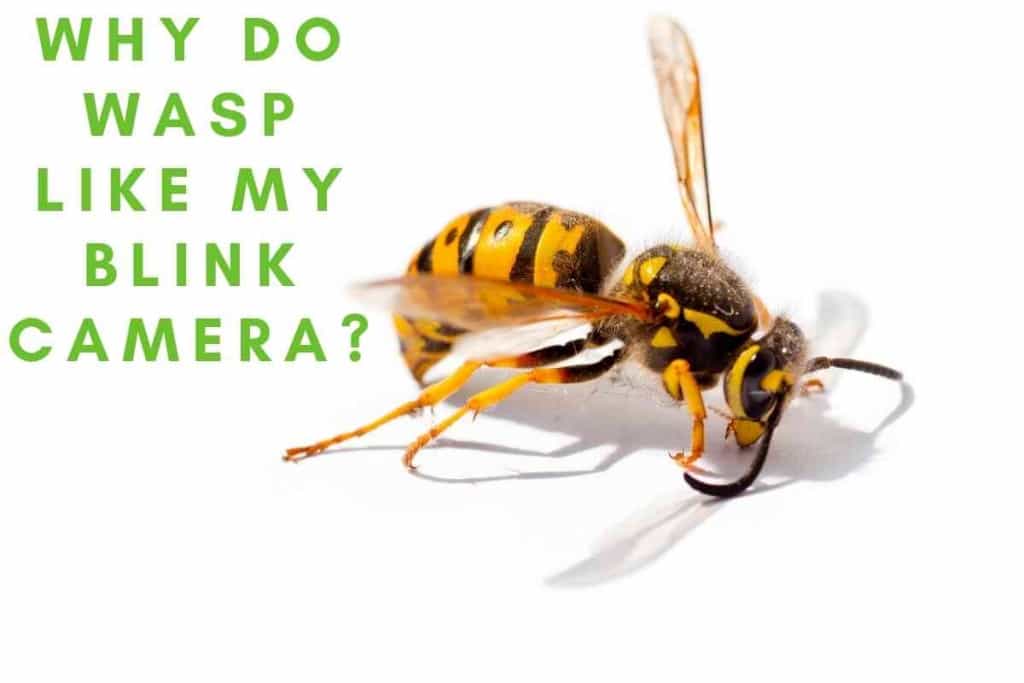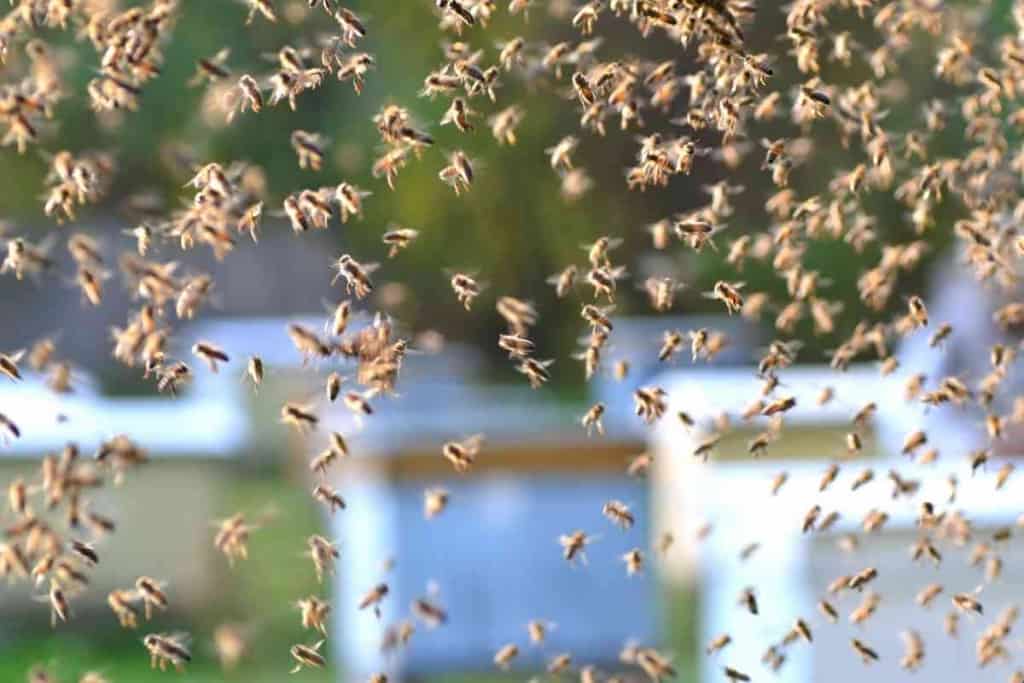Why Do Wasps Like My Blink Camera?
Blink security cameras are a common sight in today’s world. They are used to deter crime, catch criminals in the act, and provide evidence in court cases. However, they can also be a source of annoyance for home and business owners, as wasps are attracted to Blink cameras.

While you are researching Blink Cameras, be sure to bookmark the Blink category page and these other popular articles for future reading: Why Is There A Delay On My Blink Camera?, Will Blink Cameras Work With A Hotspot?, and Blink Camera Accessories
Bugs are attracted to the heat emitted by the camera’s sensor. In some cases, insects can even build nests inside the camera housing, causing long-term damage.
Why Do Wasps Like My Blink Camera?
Security cameras emit a faint magnetic field. This signal is too weak for humans to detect, but wasps are highly attracted to it. In fact, wasps will often build their nests near security cameras because of this.
While there is no surefire way to prevent bugs from being attracted to security cameras, there are a few steps that can be taken to minimize the problem.
For example, regular cleaning of the camera lens will help to remove any egg deposits that may be present.
Additionally, using an insecticide spray around the camera’s perimeter can help to keep bugs at bay.
Read on to learn more about why wasps love Blink security cameras and what you can do to deter them.
How Do You Keep Bugs Off Security Cameras?
You can do a few things to help protect your Blink security camera from bugs.
First, make sure that the area around the camera is free of debris.
This will help to prevent insects from nesting near the camera.
Second, use a physical barrier such as a screen or cover to keep bugs from getting too close to the lens.
Finally, consider using an insecticide in areas where bugs are known to be a problem.

How To Deter Wasps
While there is no foolproof method to keep wasps away from your Blink security camera, there are a few things you can do to deter them.
For example, wasps are attracted to sweet smells, so avoid using perfumes or colognes near the camera.
Additionally, wasps are attracted to bright colors, so try to avoid wearing clothing that is too colorful when near the camera.
If you notice a wasp nest near your camera, you can try to remove it yourself or hire a professional to do it for you.
However, be sure to take precautions, such as wearing long sleeves and pants to avoid being stung.
Do Wasps See In Infrared?
The short answer is no. This is because they lack a particular type of receptor in their eyes that is needed to perceive this wavelength of light.
Instead, wasps rely on their keen sense of smell to locate food and mates.
Their sense of smell is so delicate that they can even detect pheromones – chemicals that animals use to communicate – from great distances.
So the next time you see a wasp, take a moment to appreciate these incredible creatures.
Even though they might not be able to see you, they’re still worth noticing.
Some insects, like bees, can see ultraviolet light, which allows them to find pollen and nectar hidden in flowers.
Other insects, like moths, can detect infrared light, which allows them to sense the heat given off by their prey.
However, it is not yet clear whether all insects can see infrared light.
Some scientists believe that insects may be able to see a limited range of infrared light, while others believe that they are not able to see it at all.
The jury is still out on this one, but one thing is for sure: insects have evolved a variety of different ways of seeing the world, and each type of vision has its own advantages.
What Do wasps Really Hate?
While there are various store-bought repellents available, there are also a number of household items that wasps hate.
Wasps hate the smell of citrus, so placing lemons or limes around the area can help to deter them.
Similarly, they also hate the smell of vinegar, so spraying a mixture of water and vinegar around the perimeter of an area can help to keep them at bay.
Ultimately, by understanding what wasps hate, it is possible to take steps to avoid them or keep them away from an area.
Protecting Yourself From Wasps
There are ways to protect yourself against these winged insects.
First, be sure to wear bright colors when outside during peak wasp season.
Wasps are attracted to dark colors, so by wearing light-colored clothing, you can make yourself less visible to them.
Second, avoid using sweet-smelling perfumes or lotions, as wasps are attracted to sugary scents.
Finally, if you do find yourself near a wasp nest, stay calm and slowly walk away.
What To Do If you’ve Been Stung By a Wasp
If you have the misfortune of being stung by a wasp, there are a few things you can do to ease the pain and swelling.
First, remove the stinger if it is still in the skin.
This can be done with tweezers or your fingernails.
Next, wash the area with soap and water to help prevent infection.
Then, apply a cold compress to the area to reduce swelling.
You can also take an antihistamine to help with any itching or swelling.
If you have any severe allergic reactions, such as difficulty breathing, seek medical attention immediately.
Removing a Nest Of Wasps
Wasps are important pollinators and can help to control pests in your garden.
However, they can also be a nuisance, especially if they build their nest too close to your home.
If you find a wasp nest on your property, the best course of action is to call a professional.
Attempting to remove the nest yourself can be dangerous, as wasps are fiercely protective of their young and will attack if they feel threatened.
A professional will have the necessary training and equipment to safely remove the nest, so you can rest assured that the job will be done correctly.
In addition, they will be able to provide advice on how to prevent wasps from nesting on your property in the future.
Wasp Repellent Plants
Wasps can be a pesky nuisance, especially during the summer months when they are most active.
While there are a number of ways to keep them at bay, one of the most effective is to plant wasp-repellent plants around your home.
Some of the most effective repellents include eucalyptus, mint, and lemon balm.
All of these plants have a strong scent that helps to mask the smells that attract wasps
In addition, eucalyptus and mint are also known for their ability to repel other insects, making them a great choice for those looking for a multi-purpose repellent.
When planted near doorways and windows, these plants can help to keep wasps from entering your home and causing havoc.
Popular Wireless Camera Articles
- Best Apartment Doorbells For Renters
- Ring and Blink Integration: Are Blink Cameras Compatible with Ring?
- Blink Indoor vs Outdoor Cameras
- Will Blink Cameras Work With A Hotspot?
- Why Do Wasps Like My Blink Camera?
- Do Ring Cameras Record Audio?
- Ring Chime vs. Chime Pro: 5 Key Differences
- Does Blink Work With Ring?
- How to Turn off Ring Notification Sound